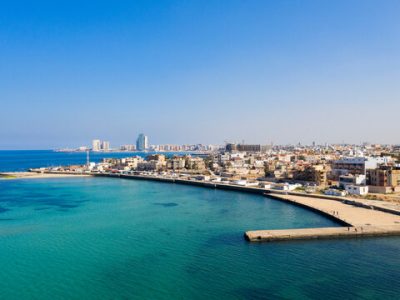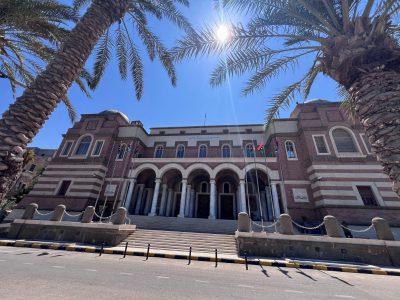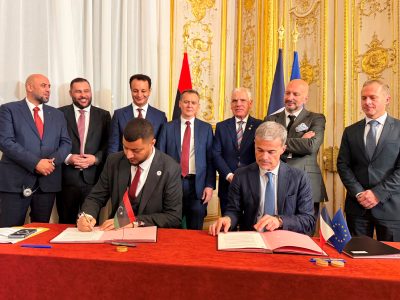The West’s Energy Endeavors in Libya Will Outrun China’s Growing Presence in West Africa
In today’s geopolitical chess game, energy is no mere pawn. It’s the board itself. And right now, the West is making smarter moves in Libya than China is in West Africa.$
Libya, battered by years of civil strife, is slowly making a comeback to reclaim its role as a key energy player. Its strategic location on the Mediterranean and vast oil reserves have once again drawn the West’s attention – not for conquest or interference, but for long-term partnership and stability. European and American firms are making their way back to the Libyan energy market, not only to extract oil, but to invest in the country’s future and secure a stable corridor for both business and influence.
China, meanwhile, has been busy wrapping its fingers around West Africa, pouring billions into roads, railways, and ports under the Belt and Road Initiative (BRI). The problem? It’s building castles on sand. Infrastructure without stability is just concrete waiting to crumble. In this contest of strategic depth, the West’s upstream, long-term play in Libya is a more sustainable and ultimately more successful approach than China’s debt-driven development model in Nigeria and its neighbors.
Debt or Development?
At the heart of the contrast is a fundamental difference in how China and the West view their role in Africa. China is transactional. You want a port? Here’s a loan. You want a highway? Sign here, and we’ll take your oil. That’s been the modus operandi in Nigeria, where major infrastructure projects have been tied tightly to natural resource concessions. But this comes at a steep price: sovereign debt and local resentment. It’s the equivalent of offering a mortgage without checking the borrower’s income – and expecting a lifetime of returns.
Contrast this with the Western approach in Libya. Major firms like Eni and BP have recently resumed upstream operations after a long hiatus, betting not just on profits but on progress. They’re not dangling loans or fast-tracking megaprojects. They’re drilling into the source, strengthening relationships with Libya’s National Oil Corporation (NOC) and helping rebuild the core of the country’s economy. Obviously, they’re fueled by self interest – but it’s one that’s mutually beneficial.
Stability is the Strategy
Like Libya, Nigeria has also been plagued by turmoil and unrest. Kidnappings, insurgencies, and corruption continue to plague Africa’s most populous country. Yet China plows ahead, seemingly indifferent to the risks, with little regard for the long-term viability of its partners. The question must be asked: is Beijing truly invested in the future of these nations, or simply their resources?
The West, to its credit, plays a longer game. After Gaddafi’s fall, many Western firms pulled out of Libya, unwilling to expose themselves to the chaos. Critics called it cowardice. In truth, it was prudence. The West knows that lasting partnerships require fertile ground – not just oil, but order. That’s why Western energy giants have shown renewed interest only as the country stabilizes, aligning themselves with both political progress and production potential.
Here lies the crux of the strategy. Western companies recognize that stable nations are reliable partners, both economically and geopolitically. Libya, positioned just across the Mediterranean from Europe, matters far more in terms of energy security than West Africa. The West’s African energy doctrine is now more concerned in anchoring influence in a region that sits at the crossroads of Europe, North Africa, and the Middle East.
The Role of Politics in Long-Term Strategy
China’s expansion in West Africa is undeniably bold, but it is also blind in many respects. Beijing has plunged headfirst into unfamiliar political waters, pouring capital into large-scale projects with little regard for the region’s deep-seated instability. The BRI has pushed China’s influence across the continent and secured favorable oil deals, but the return on investment is near-sighted. Increasing violence and instability threaten the success of the massive infrastructure projects China has been financing. While China is doing good business in the immediate sense, its plans for regional influence could be in jeopardy.
Infrastructure is necessary, but it’s often a flimsy foundation without national stability. China’s model prioritizes construction without a comprehensive plan for governance or long-term security. There are already signs of skepticism among local populations, who are questioning whether the promised benefits of Chinese-led projects are worth the long-term debt and sovereignty concessions that come with them. In fact, Some officials even believe that the current arrangement will ultimately lead to financial crises in the region. The Chinese presence in oil-rich West Africa is becoming increasingly controversial – particularly when Beijing’s endgame seems centered on resource extraction rather than lasting development and future economic stability.
Let’s shift back to the West’s methodical approach in Libya. The West is keenly aware of the need to integrate energy investments into the broader geopolitical framework. Both the U.S. and EU have shown support for Libya’s emerging government and helped bolster its security forces – not just to protect the oil fields but to ensure that the country doesn’t slip back into chaos. This nuanced strategy recognizes that any business venture in Libya is inherently political. By assisting Libya in its recovery, the West is investing in the future – both for the country and its own energy security.
China, on the other hand, has no such strategy for political stability in its operations in West Africa. The absence of any serious political engagement in the region confirms its more transactional and short-term view. While Beijing is focused on infrastructure, the West has not only rebuilt the energy sector but is also a key partner in creating conditions for lasting political stability.
The Bottom Line: The West’s Long-Term Strategy Will Outpace China’s Short-Term Bargains
The West’s energy-focused strategy in Libya offers a more sustainable and relationship-driven approach compared to China’s infrastructure-for-oil model in West Africa. While China secures short-term contracts, its reliance on debt-fueled projects often sparks local distrust and political risk. In contrast, the West is investing in long-term stability, governance, and mutual interests – laying the groundwork for enduring partnerships.
Libya’s vast energy resources and strategic location make it a valuable ally. As global energy priorities shift, the West’s steady, long-term strategy is better positioned to maintain influence in North Africa, while China risks being bogged down by instability and unfulfilled promises in West Africa.




